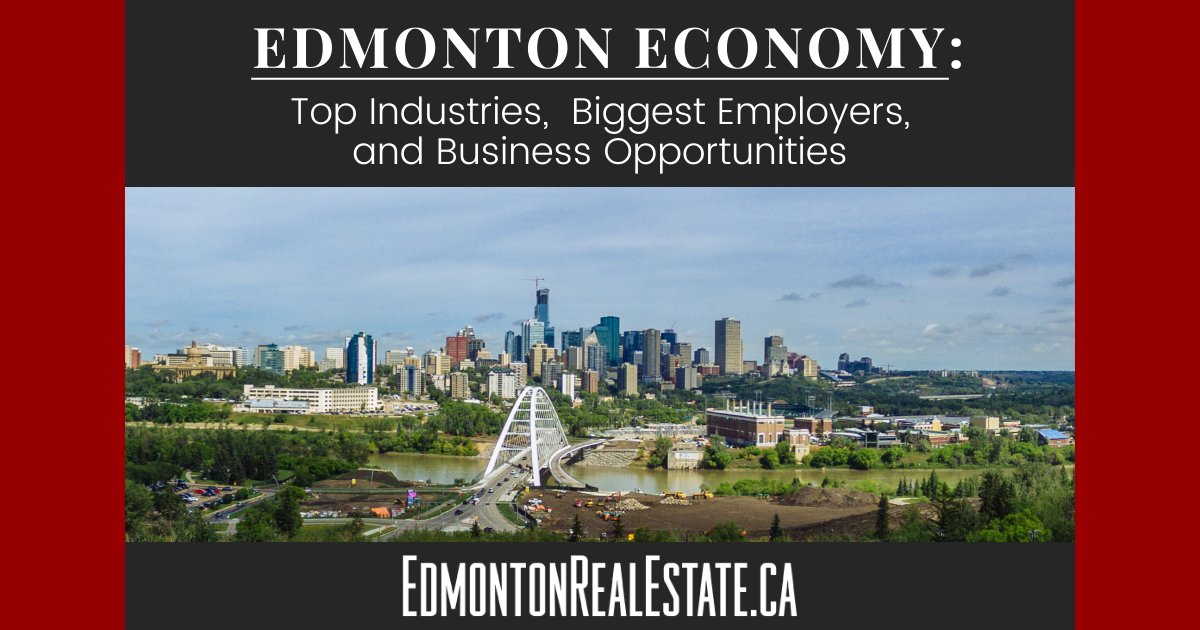Edmonton Economy: Top Industries, Biggest Employers, & Business Opportunities
Posted by EdmontonRealEstate .ca on Friday, January 8th, 2021 at 12:11pm.

Edmonton is the capital city of Alberta and the principal city within the Edmonton Metropolitan Region. It is the north anchor of what is known as the Calgary-Edmonton Corridor. With a population of 1,461,000, Edmonton is Alberta's second-largest city, trailing only Calgary, and Canada's fifth-largest municipality overall.
Edmonton is considered to be a cultural, educational, and governmental hub, in addition to Alberta's petrochemical powerhouse. Supply and service industries support the region's energy extraction efforts, while new technologies and value-added processing have resulted from research targeting the energy sector. Its massive oil, gas, and oil sand reserves are reportedly the second-largest in the world, behind only Saudi Arabia. If you're moving to Edmonton, here's everything you need to know about the local economy.
Edmonton Industries
Energy dominates the Alberta economy, including that of Edmonton, which was first labelled the "Oil Capital of Canada" back in the 1940s. The province's energy sector is estimated to contribute more than $71.5 billion and represent about 7 percent of Canada's gross national product, surpassing even the country's banking and insurance sectors.
Number of People Employed By Minneapolis Top Industries
The province is the largest producer of natural gas, gas products, conventional crude oil, and synthetic crude oil in all of Canada. The mining, oil, and gas extraction industries alone employ an estimated 2.3 million people within the province.
Edmonton's thriving gas and oil industry has given rise to growth in the city's technology sectors as well, which has earned the city its reputation as the country's premier research and education centre. The University of Alberta is a major player in research initiatives and is home to the National Institute for Nanotechnology.
Edmonton is also a major financial centre, with regional offices of the nation's most prominent banks located there, along with headquarters of more localized financial institutions.
Edmonton's geographical location has also spurred the distribution and logistics sector. The city is home to CN Rail's North American operation facility and a major multi-mode freight facility. CN Rail has announced its intentions to close other facilities and consolidate its operations in Edmonton.
Edmonton's economy is not entirely tied to the energy sector and the industries that have grown out of it. For example, the city is known as a global innovator in the retail world. Edmonton is home to North America's largest mall, also considered to be the 10th largest mall worldwide. It also features several big-box shopping centres, including North America's largest open-air retail development. Edmonton is also known for making use of urban settings, with its downtown featuring Old Strathcona, consisting of multiple independent stores located close to one another along adjoining streets.
Top Industries in Edmonton
- Energy
- Agriculture
- Manufacturing
- Advanced Technology
- Financial Services
- Tourism
Edmonton's Top Employers
Edmonton has at least 35 leading companies, organizations, and entities employing 1,000 or more people.
 Leading that list is Alberta Health Services (AHS), with about 123,000 employees in total. AHS is the country's first and largest fully integrated health system, serving the entire province of nearly 4.4 million people. The organization is also supported by an estimated 10,800 physicians practising throughout Alberta. AHS offers services and programs in medical, psychological, substance abuse, end-of-life, and long-term care at over 850 facilities throughout Alberta. It has an annual operating budget of $15.365 billion.
Leading that list is Alberta Health Services (AHS), with about 123,000 employees in total. AHS is the country's first and largest fully integrated health system, serving the entire province of nearly 4.4 million people. The organization is also supported by an estimated 10,800 physicians practising throughout Alberta. AHS offers services and programs in medical, psychological, substance abuse, end-of-life, and long-term care at over 850 facilities throughout Alberta. It has an annual operating budget of $15.365 billion.
The second-largest employer in Edmonton is the government of Alberta, employing over 27,000. The Alberta Legislative Building is located in the city, along with a majority of the province's departmental, agency, and program offices located there.
Edmonton's third-leading employer is Stantec, which employs about 22,000 designers, project managers, engineers, and scientists in total. Stantec provides engineering, architectural, and related services, including power engineering and oil and gas sector services. The international company is headquartered in Edmonton, with locations across North America and internationally. It has been involved in projects for the newly expanded airport at Edmonton, as well as its light rail transit, in addition to the Kennedale Wetlands and a multitude of other projects within the community.
PCL Constructors Inc. is Edmonton's fourth-leading employer, with about 16,000 employees total. The construction company works in the commercial, education, residential, and institutional sectors, serving customers worldwide, with headquarters in Edmonton.
Rounding out Edmonton's five leading employers is the University of Alberta at Edmonton, with 15,000 total employees. As one of the country's top teaching and research universities, the institution has built an international reputation across the engineering, sciences, humanities, creative arts, business, and health sciences disciplines. The university has five campuses, four of them in Edmonton.
Additional Large Companies in Edmonton
- Alberta Motor Association
- Workers Compensation Board
- MacEwan University
- Northern Alberta Institute of Technology
- Servus Credit Union
- Edmonton Public School District
- DynaLIFE
Edmonton Economy Facts and Figures
Alberta's gross domestic product value is estimated at about $338.2 billion. While the province's economy, including that of Edmonton, has been closely tied to fossil fuels, the region's economy is also impacted by agriculture, forestry, education, finance, tourism, and manufacturing.
Annual GDP per Capita in Edmonton
The cost of living index for Edmonton is 70.41 percent. Consumers in Edmonton spend about 34 percent of their monthly budget on groceries, compared to 25.5 percent on housing and under 10 percent on transportation.
Alberta is known for having the lowest taxes of any province or territory of Canada. Personal income tax rates are according to income brackets. For example, those earning up to $131,200 fall into the 10 percent tax bracket, while those earning $314,928.01 or more will fall into the 15 percent bracket.
The average sale price for homes in Edmonton is $385,000, representing a 7.6 percent increase year over year. The city represents the sixth most expensive housing market out of 15 communities in the region. Those searching for luxury homes in Edmonton can find plenty of options.
The average salary in Edmonton is $70,489, with an average hourly rate of $34. Average salaries for popular occupations in Edmonton include $93,000 for accountant; $91,000 for registered nurse; $132,000 for human resources manager; $108,000 for web developer; and $117,000 for engineer.
Edmonton's unemployment rate is around 8 percent.
The city's median household income is $95,840, a 2.39 percent increase year-over-year.
Some of the highest paying job opportunities in Edmonton include mine supervisor at $170,000; accounting manager at $150,862; sales manager at $120,000; sales representative at $120,000; and technical sales representative at $200,000.
Goods and services are charged only the federal goods and sales tax rate of 5 percent.
Working and Living in Edmonton
Edmonton is a city built on the oil and gas industry, which has been a driver of its economy dating back many decades. The dominance of the industry has led to the development of other industries, including emerging technologies, which are now having their own impact on the city's more diverse economy today.
In addition to being a major economic centre for oil and gas, Edmonton serves as the provincial capital, which brings numerous government jobs to the region.
Edmonton has also built a global reputation for its retail industry. Home to North America's largest shopping mall, the city is also the location of North America's largest open-air retail development and has been innovative in placing retail shopping centres in central urban, rather than suburban, districts. This makes it easy to find a downtown Edmonton condo with access to some of the best shopping in Edmonton.
If you're looking for the perfect Edmonton home, contact EdmontonRealEstate.ca in partnership with Justin Havre at (780) 800-9644 to get in touch with a local Edmonton real estate agent and discover your new dream home today.

